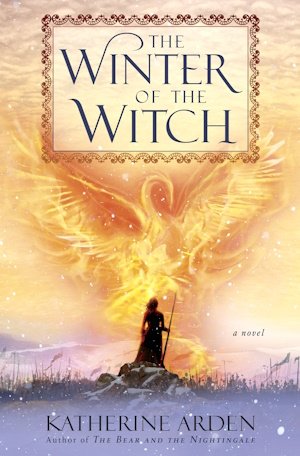“Perhaps now you will turn your mind to things proper for a woman.
In the time that is left to you.”
She said nothing, her eyes lost.
“Your fate is decided,” Konstantin added, bending nearer, as though he could force the words through her mind. “The people have been wronged; they want justice.”
“What fate is that?” she whispered through bruised lips. Her face was the color of the snow.
“I advise you,” he whispered, gently, “to pray.”
She threw herself at him, like a creature wounded. He almost laughed with unlooked-for joy, when a blow from another man’s fist flung her down, crumpled at his feet.
4.
The Fate of Al Witches
“WHAT IS THAT NOISE?” DMITRII demanded. Few of his gate-guards had survived the night unwounded; the few that had all seemed to be shouting. Outside the walls of his palace came a tumult of voices and the sound of many feet in the snow. The only light in his dooryard was torchlight. The noise in the city rose steadily; there came a shattering crash. “Mother of God,” said Dmitrii. “Have we not had trouble enough already?” He turned his head to snap swift orders.
Next moment, the postern opened amid a flurry of shouting. A servant with yellow hair strode without diffidence up to the Grand Prince, trailing Dmitrii’s bewildered retainers in her wake.
“What is this?” Dmitrii demanded, staring.
“That is my sister’s body-servant,” said Sasha. “Varvara, what do
—”
Varvara had a bruised cheek, and her expression chilled him to the marrow.
“Those people you hear,” Varvara snapped, “have broken the gates of the palace of Serpukhov. They killed the bay stallion that Vasilisa loved”—here Sasha began to feel the blood draining from his face
—“and they have dragged off the girl herself.”

“Where?” said Sasha, his voice remote and terrible.
Beside him, Dmitrii was already calling for horses, for men-at-arms: “—Yes, even if they are wounded, get them on horses, it cannot wait.”
“Down,” said Varvara, panting. “Down toward the river. I fear they mean to kill her.”
VASYA WAS NEARLY SENSELESS with the mob’s fists, her clothes torn and bloodied. She was borne along, half-dragged, half-carried, and the world was full of noise: shouting, a cold, beautiful voice controlling the crowd, and the word, endlessly murmured— Father. Batyushka.
Down, they were going downhill; she stumbled in the hardened slush of the street. Hands—many hands—scoured her body; her cloak and letnik had been ripped away, leaving her in her long-sleeved shift, her kerchief gone, her hair falling about her face.
She was barely aware of it. She was locked in a single memory: the impact of a club, a blade, the shock that ran through her own body.
Solovey. Mother of God, Solovey. As the mob raged, all she could see was the horse, lying in the snow, all the love and the grace and the strength broken and muddied and stilled.
More people were tearing at her clothes; she knocked one groping hand aside, and a fish-smelling fist struck her across the face, bringing her teeth together. Pain like stars exploded on her mouth; the neck of her shift tore. Konstantin’s even voice remonstrated, too late, with the crowd. They drew back, a little chastened.
Still they dragged her downhill. All around was torchlight, throwing sparks across her sight. “Finally frightened?” Konstantin murmured to her under his breath, his eyes bright, as though he had bested her at some sport.
She hurled herself at him a second time, in a rush of rage that swallowed up her pain.

Perhaps she was trying to get them to kill her. They nearly did.
Konstantin let the crowd punish her. A gray fog slipped slyly over her sight, but still she did not die, and when she came back to herself, she realized that they had borne her past the gates of the kremlin.
Now they were in the posad, the part of Moscow that lay outside the walls. Still hurrying; they were going down to the river. A little chapel loomed up. They paused there for a swift debate. Konstantin spoke, though she caught only a word here and there.
Witch.
Holy father.
Bring wood.
She wasn’t really listening. Her senses were numb. They had not harmed her sister, they had not harmed Marya. Her horse was dead.
She cared not what they did with her. She did not care for anything.
She felt the change in the air, when she was thrust from the beating, insistent torchlight into the darkness of a candlelit chapel.
She tumbled to the floor not far from the iconostasis, jarring her torn mouth.
There she lay, breathing the smell of dusty wood, passive with shock. Then she thought that she might try to rise at least, stand with a little courage. A little pride. Solovey would have. Solovey…

























